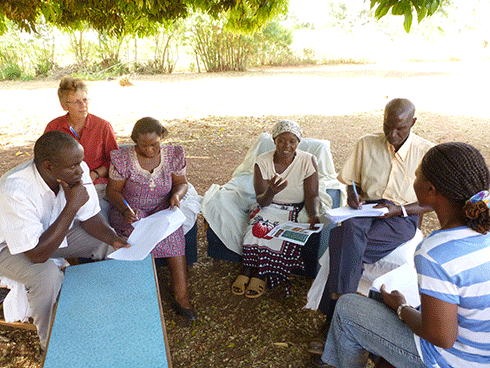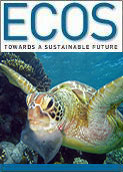
|
Published: 26 August 2013
Jocelyn Davies: Building trust between cultures
In May this year, Dr Jocelyn Davies won CSIRO’s inaugural award for Excellence in Research Ethics, recognising her work in developing cross-cultural relationships here and abroad, notably in CSIRO’s work for AusAID on food security in Africa. In the first of a two-part interview, Mike McRae asks Jocelyn about the challenges in developing, and maintaining, enduring partnerships between indigenous communities and research groups in Australia.
What inspired you to work in cross-cultural research?
I worked for a decade in national park management in eastern New South Wales, as a ranger and as a regional planning coordinator. This was in late-1970s to mid-1980s.
On my second visit to China, in 1988, I did a few months’ project work in Wolong Nature Reserve, one of the giant panda reserves. There I saw the many different perspectives on conservation of that iconic species – from Chinese managers, local indigenous people, western conservation scientists and caring conservation-minded western tourists.
In China, I realised that those national parks I had managed in NSW were all Aboriginal land. I had learnt about their cultural heritage values and had worked closely with several Aboriginal people but had not appreciated that those parks were Aboriginal people’s country. The distant view from China helped me recognise that blind spot.
How do you develop mutual trust and respect in cross-cultural research partnerships?
Like any collaborative endeavour, it’s really important to develop a shared understanding of why researchers and Indigenous communities might work together.
Research is a way to develop new knowledge, but some of the knowledge an outside researcher might see as necessary or important might not be appreciated by community members. Or community members might have knowledge that works well for them and that researchers are not aware of.
Overall, it is important to build mutual understanding and a sense of common purpose, and this can take time and shared experiences.
While this is well appreciated by many researchers who work with Aboriginal people, the interchange often still seems one-sided. Researchers may learn a lot about the priorities, issues and concerns of Indigenous community members, yet community members do not get a balanced understanding of what is important to the researchers.
The increasing role that Indigenous people have as research leaders and as co-researchers means they are increasingly directly engaged in defining research questions, collecting data, analysing and publishing.
This is helping Indigenous community members and researchers see that there are aspects they cannot do alone, building mutual trust and respect.
How do you go about identifying common ground between the interests of researchers and those of Indigenous organisations?
Talk to people on staff and on the board of management. Ask about their issues and asking about their experiences with research and their priorities for research.
Some Indigenous organisations have very sophisticated processes for prioritising and commissioning research that is important to their strategic interests.
For example, the rollout of Opal fuel in central Australia – with low level of aromatics and a composition that does not provide chemical ‘highs’ for petrol sniffers – was driven by Indigenous organisations who researched the cost/benefit of this innovation. They then used that analysis to get politicicans on side to support the rollout.
Where Indigenous organisations identify strategic directions, researchers have a clear framework in which to consider what contribution they might be able to make.
In other cases, researchers have played an active part in identifying research directions that address the expressed interests and underlying motivations of Indigenous people and build capacity among Indigenous organisations to realise changes in policy that support those interests.
How important is it that knowledge produced through partnerships is applied within the communities who participate in the research?
The challenge for researchers is to make research findings accessible and meaningful to Indigenous communities.
Research that engages with Indigenous ecological knowledge, for example, might be of interest to the broader research community because it expands global understanding of ecological processes and values.
However for Indigenous knowledge holders, the most important thing is invariably how the research process might help keep that knowledge vital within the community.
Research processes that engage both elders and young people can result in revitalisation and transmission of knowledge between generations, or it can develop new understandings in the communities about challenging issues.
In these ways, the research process itself directly contributes to the community’s knowledge base.
Researchers also need to be prepared to invest in tangible, enduring research outputs – such as DVDs, illustrated books and translation of findings into local languages – which can continue community learning and hold memory of the research after the end of a research project.
Does Indigenous ecological and cultural knowledge have an ‘intellectual property’ value? Read Jocelyn’s thoughts on this and more here.




